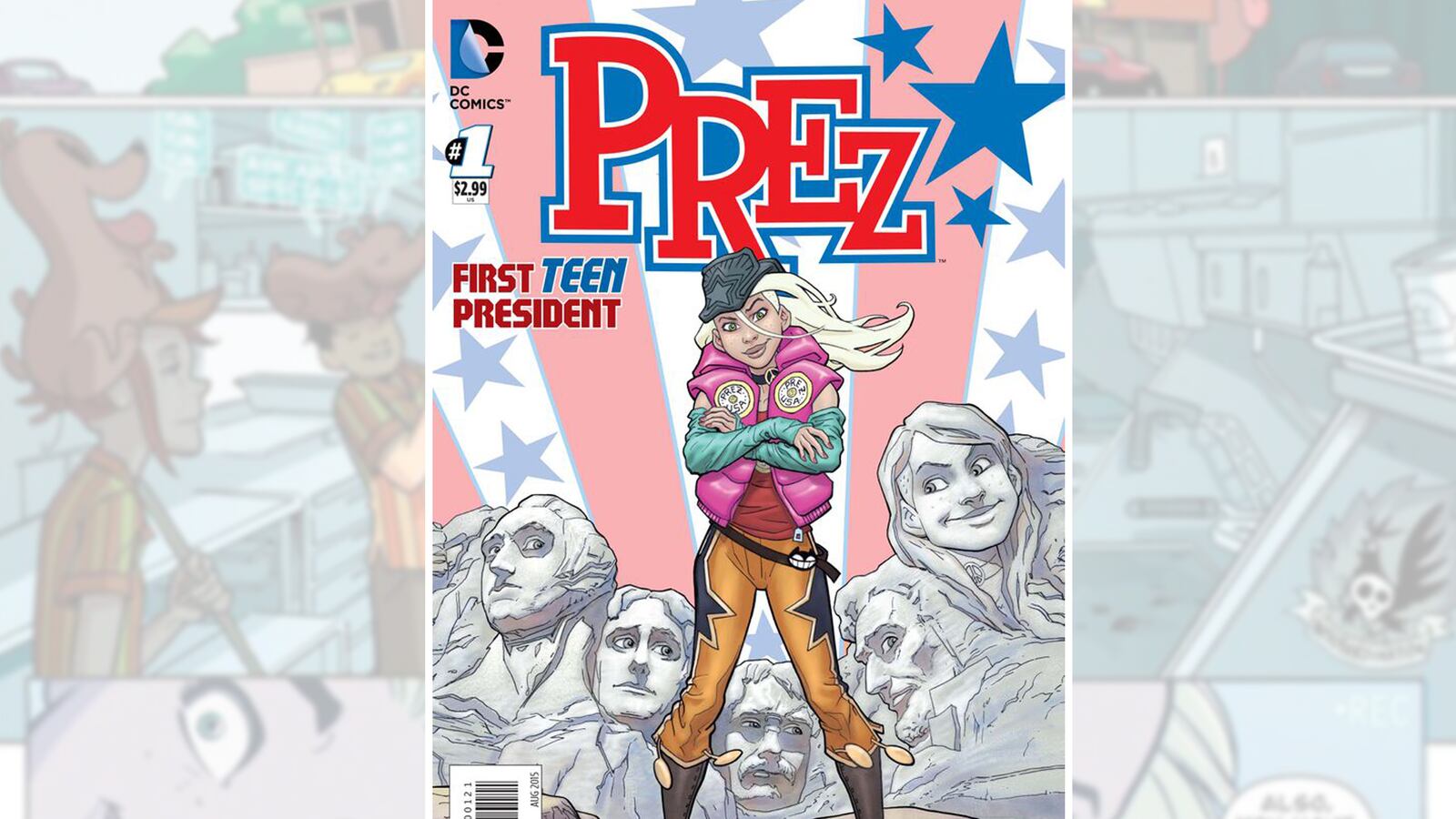The 26th Amendment to the U.S. Constitution was one of the fastest adopted with the least opposition.
No one in the Senate voted against it, and only 19 representatives in the House said nay to 18-year-old Americans having the right to vote. All told, it took less than a year from introduction to adoption. Of course, age restrictions of other varieties remain in place.
You still have to be 21 to drink alcohol, renting a car is off limits to anyone under 24 years old, and you must be 35 to hold the office of president of the United States.
In Prez, a new series from DC Comics, that age restriction has been rescinded as the result of another constitutional change, the Corporate Personhood Amendment, which allows private companies to run for public office and lowers the voting age to reflect the age disparity between businesses and human beings.
It ends up backfiring when Beth Ross, a 19-year-old viral Internet sensation, wins the hearts and minds of social media voters and forces a runoff election between herself and two establishment candidates. As a result, Beth becomes the first teen president of the United States.
DC has planned at least 12 issues of Prez, which may expand up to 16 if the books find an audience. In an interview with The Daily Beast, DC Comics writer Mark Russell said, “It will coincide with the 2016 election cycle and add relevance to the comic. The whole series will cover most of President Ross’s first term.”
Russell, who was born in 1971 (the year of the 26th Amendment’s ratification), supports repealing the age restrictions currently in place for the executive office. “Age restrictions have not given us a better grade of politicians than we have otherwise,” he says. “The Boomers and the Gen-Xers have been a disaster. They’ve done nothing to address long-term problems and have even exacerbated those problems. I can’t wait for Millennials to take over.”
Russell sees the current age restrictions as limiting the ability of politicians to achieve higher office without making concessions to entrenched interests. “It’s not unique to politics. The more you know the rules, the less interesting or effective you become. The real innovative things that I like in pop culture, like punk rock or golden age TV—that was all made by people who didn't know what they were doing. They had no clue. That’s what I wanted. Someone with no clue about politics. I wanted a president that could do something new. Spending years in Congress turns politicians into prog rock musicians. They can do a 20-minute keyboard solo, but they are limited by the systems that trained them.”
President Beth Ross is not the first teen comic book POTUS. DC first introduced the idea of a teen president in 1974 with a short run book of the same title. The character, Prez Rickards, is a Mr. Smith Goes to Washington-type character, cynically chosen by political manipulator Boss Smiley to hoodwink the newly enfranchised youth vote into supporting the white capitalist patriarchy.
Created by comic book legend Joe Simon and Jerry Grandenetti, the series only lasted for four issues, but the character, Prez Rickards, has appeared in various DC Comics in the four decades since. Apart from cameos in diverse titles, Neil Gaiman resurrected the character in Sandman, and in Smells Like Teen President, a one-off book from the mid-’90s in which the character’s biological son goes on a cross-country road trip looking for his missing father. Prez and Sandman were some of the last titles on which Simon worked with longtime collaborator Jack Kirby.
Jim Simon is the son of the original series’s creator, was present at the character’s genesis, and participated in Prez Rickard’s creation. Simon told The Daily Beast, “It was the early ’70s, Prez was created in Joe Simon’s studio, in the house where we lived in Stony Brook, New York. I was helping out in the studio. Jerry Grandenetti, the artist, who lived nearby, was there, and we were all kicking around ideas for a new comic book character that wasn’t a typical superhero and that fit in with those turbulent times. We got to talking about a movie we had all seen on TV that we enjoyed, Wild in the Streets, and riffed off the movie: what America might be like if the youth movement got one of their own into the White House. As you know, Joe created the satirical-humor magazine SICK, and I believe he saw more humor than drama in the Prez premise. We all did eventually.”
About the decision to make the new Prez a teen woman, Simon told The Daily Beast “[It’s] a smart move by DC, in my opinion. The creative team handled it pretty well, continuing the satirical drama and the general themes of Joe Simon’s Prez.”
Addressing the issue of gender in the update Prez, Russell said, “We have tested gender roles to their limits, and it seems society is ready to give up on them. They’re arbitrary constructs of an agrarian society. They’re not really useful or meaningful in post-agricultural or post-industrial society. And not in an information age. [When Prez is elected] In 2036, gender roles are almost extinct. To the extent they’re maintained, they’re a relic of the past. People who maintain traditional gender roles are so out of touch with the world they live in. They’re consigned to narrow visions.”
Mark Russell—along with Shannon Wheeler—is the co-author of God Is Disappointed In You and the comic strip Eaglesport for Nailed Magazine (but no relation to the satirist of the same name). Until he was approached to reboot the series, Russell had never heard of the obscure character. DC sent him copies of Sandman #54 and Smells Like Teen President in addition to the original issues (which are now available online at Google, Amazon, and Barnes and Noble).
Rounding out the Prez team are artists Rags Morales, Ben Caldwell, and Corrina Lawson. Caldwell posted some pencil drawings of Prez to his blog in the runup to the first issue, drawings that were used in DC’s public preview. On his blog, Caldwell also related a story about working for ToyBiz, a division of Marvel Enterprises, for whom the artist was part of a team that created the figures for the first X-Men film in 2000. As is too often the case for children’s toys, the Jean Grey figures were cast with what Caldwell calls “an awful lot of cleavage … exposed.”
Caldwell writes that when the figures were recast with more clothing, “I heard several people complain afterward about how toybiz had obviously made these multiple Jeans as a way to ‘trick’ collectors into getting three versions of the figure. Some of the reactions to the first Prez promo image (which was, in fact, just a personal test sketch) remind me of the phantom cleavage.”
Russell says, “It's a fair critique. There’s a strong current moving comics away from sexism, and that’s obviated by costumes. I don’t see what we tried to do in Prez as overthrowing sexualized costumes. Rather to show people as they really are and not use them as bait for male readers.”
Concerning the original series’s cancellation, Russell said, “It did not capture the zeitgeist. It captured the paranoia about youth having the vote, but did not have a ring of authenticity. It tried to be a celebration of new youth, but what came through was the paranoia about hippies taking over. And the hippies never coalesced enough. Youth culture dissipated after the early ’70s. That's what was fascinating about this project. What if Prez was written by someone who wasn't jaded about youth culture?”
According to Simon, “[I]n those days DC tended to cut new titles before [they] had a chance to find an audience. In the real comic world a new title does not always get an instant audience. I find it interesting that Neil Gaiman and Ed Brubaker saw something in Prez and later did some interesting stuff with the character.”
The first issue of the new Prez takes place in 2036 and highlights Beth’s rise in popularity in the days before the initial presidential election. When a video goes viral of her dipping her hair into a deep fryer at an all-corn dog fast-food restaurant, she leapfrogs ahead of the Democratic and Republican candidates (who are still old and/or white, even 20 years from now). Like the fourth season of the recently concluded HBO series Veep, no one has enough electoral college votes to win the presidential election and the race moves to the House of Representatives.
“I have always been fascinated by politics as litmus test for mass psychology,” Russell said. “I read a lot about politics to keep up on issues. Working on Prez gave me the opportunity to research a lot of concerns that I already had. I could vent feelings and opinions about the state of the world.”
Like the original series, the new Boss Smiley is a man in a suit with a yellow smiley face for a head. The Corporate Personhood Amendment, while giving corporations the same citizenship privileges as people, has also enabled them to hide their identities and so their leadership conceals their faces with glowing masks.
“Smiley Enterprises is the largest retail corporation in the world. There are elements based on existing retailers, but they are bigger than any particular company. There are some implicit references and they embody the service economy,” Russell said. “Originally, Boss Smiley was ominous power broker, like a Tammany Hall figure, who tried to get Prez elected as a pawn. That kind of political power wasn't as relevant a reality in the ’70s. What is relevant in current society is the corporate power that goes into the American political process.”
Speaking about the history of the logo, Jim Simon said, “I don't know if today’s younger readers know the smiley face but in the ’70s that image was all over the place—it became iconic. I understand the guy who designed the original smiley face never copyrighted it, unfortunately for him. I hope Joe gets a creator credit.”
Smiley’s company, Smiley Enterprises, is the head of a cabal of corporate interests that panic when it looks like their handpicked candidates might lose to a female teen.
The fear that teens would disrupt the democratic process with their voting is an idea that also traces its roots back to the ’70s. Today’s youth may not realize that the 26th Amendment was signed into law by Richard Nixon in the same year he launched the war on drugs that would prevent millions from exercising that right. The 26th amendment was ratified in July 1971; the “War on Drugs” was announced in June.
Since Beth is 19 when she is elected in 2036, she won’t be born for another two years. Meanwhile, a child born today in 2015 will have to wait until 2050 before he or she is eligible to become president.
Prez is available from the DC Comics store and Amazon.







